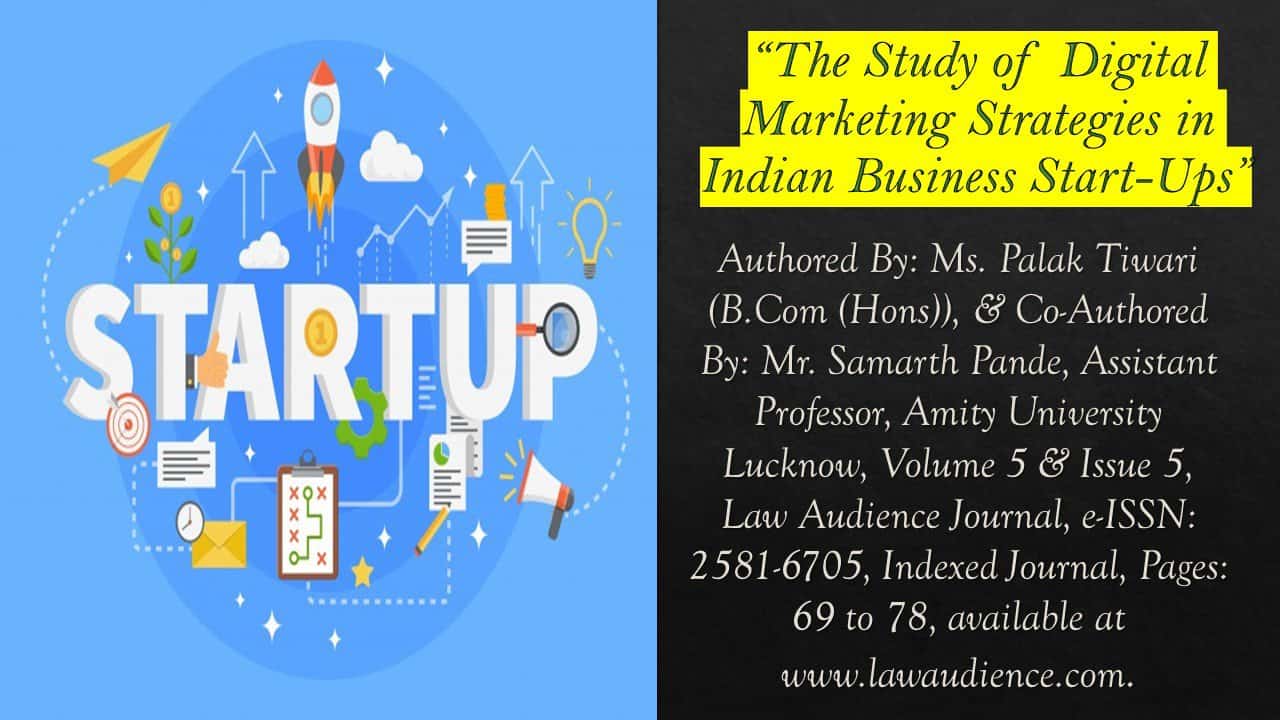Click here to download the full paper (PDF)
Authored By: Ms. Palak Tiwari (B.Com (Hons)), & Co-Authored By: Mr. Samarth Pande, Assistant Professor, Amity University Lucknow,
Click here for Copyright Policy.
ABSTRACT:
“This paper investigates the profound influence of digital marketing strategies on the growth and success of Indian business startups. In recent years, India has witnessed a surge in entrepreneurial activity, propelled by advancements in technology and digital infrastructure. Against this backdrop, startups are increasingly leveraging digital marketing as a pivotal tool to enhance their visibility, engage with target audiences, and drive business growth. Through a comprehensive analysis of existing literature, empirical research, this study aims to elucidate the multifaceted impact of digital marketing strategies on Indian startups. The research examines the various digital marketing channels and techniques adopted by startups, focusing on their efficacy in brand building, lead generation, customer acquisition, and revenue generation. Furthermore, it delves into the challenges and barriers encountered by startups in implementing effective digital marketing strategies, considering factors such as limited resources, fierce competition, and evolving consumer preferences”.
Keywords: Digital marketing, Indian startups, Business growth, Digital Marketing Strategies.
I. INTRODUCTION:
The incorporation of digital marketing methods has become a crucial factor in fostering growth, innovation, and competition within the dynamic Indian company startup ecosystem. Recent years have seen an exponential expansion in India’s startup ecosystem, driven by favourable government measures, increased financial accessibility, and a growing pool of talented entrepreneurs. Simultaneously, the spread of digital technology has completely changed how companies communicate with their customers, providing entrepreneurs with previously unheard-of chances to get noticed, connect with their target market, and promote long-term success. A wide range of digital marketing tactics have emerged because of the fusion of digital technologies and marketing concepts; each offers special benefits and potential for startups. All that digital marketing entails is curating marketing techniques on top of a digital base. As the internet developed, people’s minds began to wonder: Why not use this digital platform for marketing as well? Therefore, people are gradually starting to employ various forms of online marketing in place of classic marketing props like billboards, hoardings, and television advertising to promote a brand, create an advertisement, or capture client feedback. All of these are mostly different kinds of marketing efforts, such as those that appear on a laptop, desktop, mobile device, tablet, or social media post when someone is using that digitally. They also include SEO marketing, online commercials, and video ads. Startups possess an array of channels at their disposal to enhance their brand messaging, cultivate client relationships, and propel revenue production, ranging from social media platforms and search engines to email marketing and influencer alliances. Startups can obtain significant insights into consumer behaviour, preferences, and market trends by utilizing data analytics, which will help them target their marketing campaigns more precisely and successfully.
Types of digital marketing strategies used by Indian start-ups:
- Social Media Marketing: Leveraging social media platforms such as Facebook, Instagram, Twitter, LinkedIn, and others to connect with target audiences, build brand awareness, and drive website traffic or sales.
- Search Engine Optimization (SEO): Optimizing website content and structure to rank higher in search engine results pages (SERPs), thus increasing organic (non-paid) traffic. Researching keywords, improving the page, creating links, and other strategies are all part of this.
- Content Marketing: Creating and distributing valuable, relevant, and consistent content to attract and retain a clearly defined audience. This could include blog posts, videos, infographics, podcasts, and social media content.
- Influencer Marketing: Collaborating with influencers or industry experts who have a significant following on social media or other online platforms to promote products or services to their audience.
- Video Marketing: Creating and sharing video content on platforms like YouTube, or Instagram to engage audiences, demonstrate products or services, and increase brand
- Email Marketing: Sending personalized and targeted emails to subscribers to nurture leads, promote products or services, and engage with customers. Newsletters, special offers, product updates, and more might fall under this category.
I.I RESEARCH METHODOLOGY:
I.I.I Objectives:
- To evaluate the current scenario of digital marketing in Indian business start-
- To identify the most used digital marketing channels and techniques among Indian
- To examine the digital marketing strategies in increasing brand awareness and revenue generation in Indian startups.
- To explore the challenges faced by Indian startups in digital
I.I.II NATURE OF STUDY:
The study involves empirical research employing both quantitative and qualitative methods. This includes data analysis to understand the impact of digital marketing on Indian business start-ups.
I.I.III DATA COLLECTION METHOD:
Secondary data collection method is used in this research paper by;
Review existing literature, academic journals, industry reports, and case studies to understand the theoretical frameworks, trends, and best practices in digital marketing for startups.
II. ANALYSIS:
- The digital marketing tactics used by Indian startups in the contemporary market are a dynamic fusion of creativity, flexibility, and targeted strategy. Startups in India are making heavy use of social media platforms for lead generation, customer engagement, and brand marketing due to the country’s fast expanding internet user base. With the help of content marketing, entrepreneurs can now develop thought leadership, foster brand trust, and increase organic traffic to their digital In order to improve their online exposure and attract relevant search traffic, startups are also spending more money on search engine marketing (SEM) and search engine optimization (SEO). Given that smartphones are widely used in India and that many people use mobile internet, mobile marketing is essential.
- Email marketing technique delivers impressive ROI rate in comparison to any other digital marketing channel, and it is still a key player. Some of the campaigns in India will leave you inspired, and we can learn from them how to capture market share and increase the consumer base through one marketing email as the As 250 billion emails are sent every day, email marketing is quite effective with a high return on investment (ROI), and certain Indian firms have found success with it. This strategy brings the best results and that too at very low cost. Prominent Indian firms, including Wow Momo, Zomato, Myra, Ola Cabs, and many more, have been using email marketing to build a strong online presence and have experienced rapid growth, which has led to the creation of many jobs in India.
- Social media platforms have an unimaginable impact on startups. We have all known for decades how difficult it was for founders to decide how to brand their businesses. Creating brand recognition, securing the customer’s perception of the characteristics and quality of the goods, and developing their own customer base was never easy. However, because of technical improvements, we are seeing an increase in Indian entrepreneurs who have surmounted these obstacles and created their own distinctively successful narratives with the aid of social media It is critical to realize that social media marketing gives consumers the ability to post user-generated content, such as images and videos, as well as features like ratings, reviews, and feedback, in addition to facilitating communication beyond social and local borders.
- The fastest-growing social media platform is With 74.70% of internet users enrolled, Instagram is the most popular social media network in India as of 2023. There are 516.92 million active Instagram users in India. Teenagers comprise a sizable component of Instagram’s user base. the parent company Meta, which paid $1 billion to buy Instagram. It has developed into a fantastic sales channel for companies as well as a source of revenue for creators. Social media commerce is growing in India. According to a report, the Indian industry for social commerce is expected to increase at a compound annual growth rate of 55–60% between FY 2020 and FY 2025, from $1.5-2 billion to $16–20 billion.
- Digital marketing gives startups a level playing field to compete with established businesses because it can reach specific demographics at a fraction of the expense of traditional marketing tactics. Startups can target their audience precisely, customize their messaging, and monitor the efficacy of their campaigns in real-time, all thanks to platforms like social media, email marketing, and search This allows for quick adjustments to maximize results. Furthermore, digital marketing makes it easier for businesses to communicate directly with their target audience, which promotes brand loyalty and helps startups get insightful input for future product development. In the current competitive scenario, digital marketing is an essential tool for Indian startups seeking to maximize their reach, engage with their audience, and create sustainable growth due to its cost-effectiveness, scalability, and measurable impact.
- High conversion rates are the outcome of a good digital marketing strategy, and this finally increases income for the company. When comparing digital marketing programmes to various traditional marketing channels, the revenue generated is significantly higher. Google reports that businesses with digital marketing strategies have 2.8 times higher expected revenue growth. Businesses that use digital marketing are 3.3 times more likely to of expanding their personnel and
- Challenges faced by start-ups in implementing digital marketing strategies are:
- Limited Budgets: Many startups, especially those in their initial stages, have limited resources to allocate towards marketing efforts. This restricts their ability to invest in paid advertising campaigns or hire experienced digital marketing professionals.
- Competition: There is fierce competition among the Indian startup ecosystem’s many businesses as they compete for clients in different fields. Standing out amidst this competition requires innovative and well-executed digital marketing
- Technological Challenges: Implementing digital marketing strategies requires familiarity with various technological tools and platforms. Startups may face challenges in understanding and utilizing these tools effectively, especially if they lack technical expertise.
- Changing Trends and Algorithms: Digital marketing landscape is constantly evolving, with new trends, algorithms, and platforms emerging regularly. Keeping up with these changes and adapting strategies accordingly can be challenging for startups with limited resources.
III. FINDINGS:
- By 2024, it is anticipated that the digital media market in India will reach a value of INR 537 billion. Predictions indicate that the global digital advertising and marketing market will hit $786.2 billion by India ranks as the world’s second largest online market, trailing only behind China, with a remarkable number of over 900 million internet users.
- With a CAGR of 18.8% between 2020 and 2025, India’s Internet advertising business is expanding at the fastest rate in the world. India’s income from mobile internet advertising was INR 7331 Cr in 2020 and is expected to grow at a 4% CAGR to INR 22350 Cr in 2025.
- Internet advertising: With a compound annual growth rate (CAGR) of 8% from 2020 to 2025, India is the world’s fastest-growing market for online advertising. India’s income from mobile internet advertising was INR 7331 Cr in 2020 and is expected to grow at a 25.4% CAGR to INR 22350 Cr in 2025.
- Social media is used by 77% of organisations to connect with clients. Given that companies are frequently among the first to take advantage of new technological advancements, it is not surprising that 77% of small businesses use social media to engage with their clientele in an increasingly digital business Not only do 44% of small businesses use social media to increase brand awareness, but 41% also rely on it to drive income.
- On social media, 90% of users follow at least one brand. as demonstrated by the 90% of social media users who have at least one brand follower. It’s a powerful illustration of the shift in consumer behaviour towards more direct and engaged relationships with brands—and a strong indication of the importance of brands’ strong social media presence to establish and maintain brand loyalty.
- 76% of social media users have made a purchase based on something they saw there. Even though there are differences in the buying process (11% buying right away, 44% putting off online purchases until later, and 21% choosing to buy in-store), the fact that 76% of users have purchased a product after seeing a brand’s social media post illustrates how social media has transformed the retail industry.
- Short-form videos are the most captivating kind of material on social On social media, authenticity and succinctness are both in vogue. Short-form films, which are usually under a minute long, draw in 66% of viewers. These bite-sized videos are 2.5 times more entertaining than lengthier ones, and 34% of viewers value the shorter form’s more sincerity. They are also highly shareable.
- Instagram ranked as the most popular social media network in India in 2023, with 74.70% of internet users using the There are 516.92 million active Instagram users in India. Teenagers comprise a sizable component of Instagram’s user base. the parent company Meta, which paid $1 billion to buy Instagram. It is now a great way for businesses to reach new customers and a profitable source of income for producers.
IV. CONCLUSION:
To sum up, this research study has offered a thorough analysis of how digital marketing tactics affect Indian company beginnings. Key insights into the transformative role that digital marketing plays in influencing the success and trajectory of startups in India’s dynamic business ecosystem have been gathered through a thorough assessment of the literature, analysis of case studies, and synthesis of empirical research findings. The study’s conclusions highlight the vital role that digital marketing plays in fostering startup expansion, creativity, and competitiveness. In an increasingly digitalized world, digital marketing channels and strategies have become essential tools for businesses looking to make an impression, connect with potential customers, and promote long-term success. Startups have an abundance of options to spread their brand message, cultivate clientele, and generate income, ranging from influencer collaborations and social media marketing to content marketing and search engine optimization. Furthermore, this study has clarified the difficulties and complexities Indian startups face when implementing and adopting digital marketing techniques. For startups, resource limitations, a lack of experience, and fierce competition present formidable obstacles that call for creative solutions and flexible approaches to successfully traverse the digital terrain. Despite these difficulties, digital marketing offers far more potential advantages than disadvantages. From improved customer engagement and brand visibility to increased revenue generation and market scalability, it’s an essential investment for startups hoping to succeed in the cutthroat business world of today.
Cite this article as:
Ms. Palak Tiwari & Mr. Samarth Pande , “The Study of Digital Marketing Strategies in Indian Business Start-Ups”, Vol.5 & Issue 5, Law Audience Journal (e-ISSN: 2581-6705), Pages 69 to 78 (28th March 2024), available at https://www.lawaudience.com/the-study-of-digital-marketing-strategies-in-indian-business-start-ups/.
References:
- Jain, R., & Jain, S. (2018). Impact of digital marketing on growth of Indian startups. International Journal of Recent Technology and Engineering (IJRTE), 7(6), 196-202.
- Singh, S., & Kumar, A. (2020). Digital Marketing Strategies for Indian Startups: A Study. International Journal of Scientific Research and Management, 8(5), 142-147.
- Sharma, , & Pandey, P. (2019). Leveraging Digital Marketing for Startups: Evidence from India. International Journal of Information Systems in the Service Sector (IJISSS), 11(2), 25-37.
- Dhillon, P., & Saini, S. (2021). Impact of digital marketing on the performance of Indian startups: A study of selected firms. Journal of Digital Marketing, 1(1), 34-48.
- Sinha, , & Sinha, R. (2019). Digital marketing strategies and startup success: A study of Indian startups. International Journal of Management Studies (IJMS), 6(2), 84-91.
- Mishra, A., & Bhatnagar, S. (2018). Role of digital marketing in the growth of Indian startups: An empirical study. Global Journal of Enterprise Information System, 10(3), 25-37.
- Verma, S., & Singh, S. (2020). Impact of social media marketing on customer acquisition and retention for Indian startups. International Journal of Research in Marketing Management and Sales, 2(1), 10-24.
- Srivastava, A., & Kumar, S. (2019). The impact of digital marketing on revenue generation: A study of Indian startups. Journal of Marketing and Consumer Research, 49(3), 78-92.
- Gupta, A., & Sharma, M. (2018). Adoption and effectiveness of digital marketing strategies among Indian startups: An empirical study. Journal of Entrepreneurship & Business Administration, 7(1), 56-68.
- Patil, S., & Kulkarni, M. (2020). Digital marketing trends and challenges for Indian startups. International Journal of Innovation and Economic Development, 6(4), 52-67.



